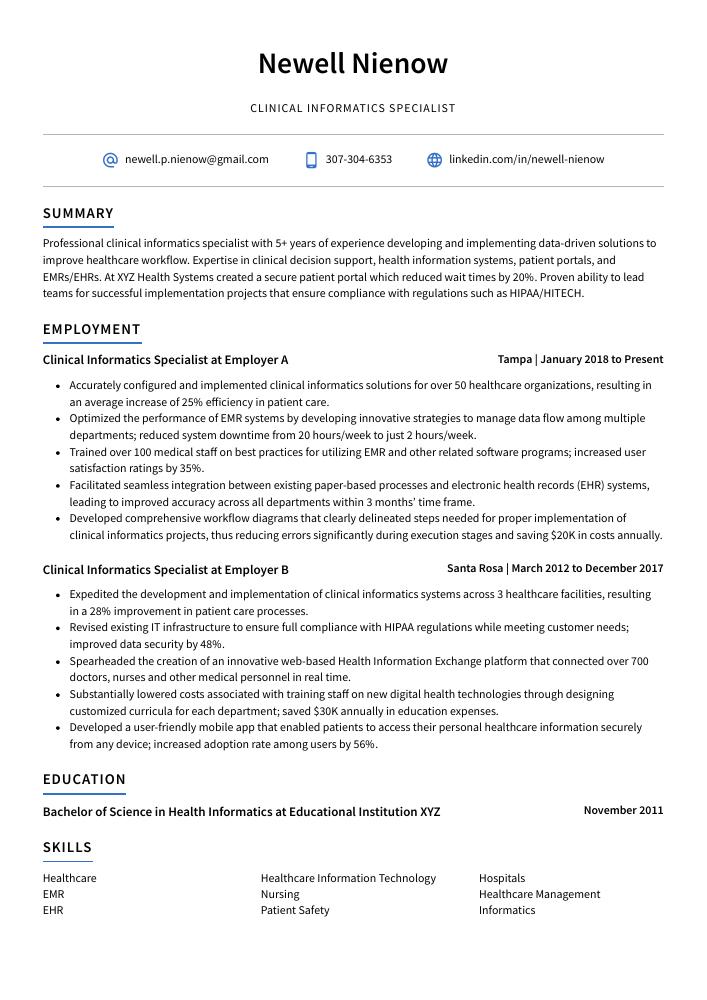Clinical Informatics Specialist Resume Guide
Clinical informatics specialists are responsible for the use and implementation of technology in healthcare settings. They analyze data to improve patient care, develop policies related to clinical information systems, coordinate with clinicians on workflow design, and provide training and support for staff members using health IT tools.
Your expertise in clinical informatics is unmatched, and you’d be a valuable asset to any organization. But potential employers haven’t seen how incredible your skills are yet. To show them what you can do, write an impressive resume that stands out from the crowd.
This guide will walk you through the entire process of creating a top-notch resume. We first show you a complete example and then break down what each resume section should look like.
Table of Contents
The guide is divided into sections for your convenience. You can read it from beginning to end or use the table of contents below to jump to a specific part.
Clinical Informatics Specialist Resume Sample
Elenor Goodwin
Clinical Informatics Specialist
[email protected]
598-142-2448
linkedin.com/in/elenor-goodwin
Summary
Professional clinical informatics specialist with 5+ years of experience developing and implementing data-driven solutions to improve healthcare workflow. Expertise in clinical decision support, health information systems, patient portals, and EMRs/EHRs. At XYZ Health Systems created a secure patient portal which reduced wait times by 20%. Proven ability to lead teams for successful implementation projects that ensure compliance with regulations such as HIPAA/HITECH.
Experience
Clinical Informatics Specialist, Employer A
Raleigh, Jan 2018 – Present
- Accurately configured and implemented clinical informatics solutions for over 50 healthcare organizations, resulting in an average increase of 25% efficiency in patient care.
- Optimized the performance of EMR systems by developing innovative strategies to manage data flow among multiple departments; reduced system downtime from 20 hours/week to just 2 hours/week.
- Trained over 100 medical staff on best practices for utilizing EMR and other related software programs; increased user satisfaction ratings by 35%.
- Facilitated seamless integration between existing paper-based processes and electronic health records (EHR) systems, leading to improved accuracy across all departments within 3 months’ time frame.
- Developed comprehensive workflow diagrams that clearly delineated steps needed for proper implementation of clinical informatics projects, thus reducing errors significantly during execution stages and saving $20K in costs annually.
Clinical Informatics Specialist, Employer B
Los Angeles, Mar 2012 – Dec 2017
- Expedited the development and implementation of clinical informatics systems across 3 healthcare facilities, resulting in a 28% improvement in patient care processes.
- Revised existing IT infrastructure to ensure full compliance with HIPAA regulations while meeting customer needs; improved data security by 48%.
- Spearheaded the creation of an innovative web-based Health Information Exchange platform that connected over 700 doctors, nurses and other medical personnel in real time.
- Substantially lowered costs associated with training staff on new digital health technologies through designing customized curricula for each department; saved $30K annually in education expenses.
- Developed a user-friendly mobile app that enabled patients to access their personal healthcare information securely from any device; increased adoption rate among users by 56%.
Skills
- Healthcare
- Healthcare Information Technology
- Hospitals
- EMR
- Nursing
- Healthcare Management
- EHR
- Patient Safety
- Informatics
Education
Bachelor of Science in Health Informatics
Educational Institution XYZ
Nov 2011
Certifications
Certified Professional in Healthcare Information and Management Systems (CPHIMS
May 2017
1. Summary / Objective
Your resume summary should be a brief, yet compelling introduction to your professional background and qualifications as a clinical informatics specialist. In this section, you can highlight the technical skills you possess such as experience with EHR systems and data analytics tools. You could also mention any certifications or awards that demonstrate your expertise in healthcare IT systems. Finally, don’t forget to include how many years of experience you have working in the field so employers know they are getting an experienced professional.
Below are some resume summary examples:
Committed clinical informatics specialist with 3+ years of experience in the healthcare industry. Deep understanding of clinical workflows and data systems, as well as a passion for improving patient care and outcomes through technology. Skilled at troubleshooting hardware and software issues while adhering to HIPAA regulations. Looking to join ABC Health Systems where I can utilize my knowledge to improve operational efficiency within their network of hospitals.
Driven clinical informatics specialist with 5+ years of experience developing and implementing clinical information systems to support healthcare organizations. Seeking a challenging role at ABC where I can use my expertise in leveraging technology, process improvement initiatives, data analysis, and system integration to improve patient care standards. At XYZ Caredelivered cost savings of $300K by streamlining the electronic health record integration process.
Hard-working and experienced clinical informatics specialist with 7+ years of experience overseeing IT operations, systems implementation and data analysis in a healthcare setting. Proven track record of streamlining processes to improve efficiency and accuracy while ensuring patient safety. Seeking to join ABC Medical Center as the next Clinical Informatics Specialist where I can use my expertise to continue providing high-quality care for patients.
Amicable and experienced Clinical Informatics Specialist with 8+ years of experience in the healthcare industry. Highly adept at utilizing modern technology to increase efficiency and improve patient care outcomes. Proven track record for developing innovative solutions that streamline operations and reduce costs, while maintaining high-quality standards. At XYZ Medical Center, implemented an EHR system which increased patient satisfaction by 15%.
Determined Clinical Informatics Specialist with 8+ years of experience in the healthcare industry. Proven track record of developing and implementing clinical information systems to support patient care initiatives. Skilled at analyzing, documenting, and reporting data for quality improvement activities. Experienced in identifying areas that need optimization or automation within a system and driving projects from conception to completion.
Proficient clinical informatics specialist with 5+ years of experience in healthcare technology, patient safety and quality improvement. Experienced in the implementation and optimization of clinical applications to support efficient workflow processes. Skilled at leading cross-functional teams of clinicians, developers and IT professionals to develop comprehensive solutions that meet organizational needs while adhering to best practices.
Skilled clinical informatics specialist with 8+ years of experience managing and implementing healthcare technology solutions. Seeking to join ABC Medical Center as a clinical informatics specialist, leveraging expertise in deploying EHR systems and health IT infrastructure to improve patient outcomes. At XYZ Hospital, increased data accuracy by 27% through the use of software automation tools.
Accomplished Clinical Informatics Specialist with 6+ years of experience designing and implementing cutting-edge clinical systems. Seeking to join ABC as a Clinical Informatics specialist, leveraging expertise in data analysis, process design, project management, system development and implementation. Led multiple successful projects that resulted in improved patient care quality by 30%.
2. Experience / Employment
Next comes the work history section, where you provide details on your employment experience. This should be written in reverse chronological order, with the most recent role listed first.
When writing about what you did at each job, stick to bullet points so that the reader can quickly digest what is being said. When describing tasks performed and results achieved, try to include as much detail as possible while also keeping it concise. For example, instead of saying “Managed a team,” you could say “Led a team of 10 clinical informatics specialists responsible for developing new software solutions; improved efficiency by 15% over 6 months.”
To write effective bullet points, begin with a strong verb or adverb. Industry specific verbs to use are:
- Implemented
- Monitored
- Analyzed
- Configured
- Optimized
- Documented
- Troubleshot
- Resolved
- Trained
- Programmed
- Assessed
- Evaluated
- Designed
- Developed
- Integrated
Other general verbs you can use are:
- Achieved
- Advised
- Compiled
- Coordinated
- Demonstrated
- Expedited
- Facilitated
- Formulated
- Improved
- Introduced
- Mentored
- Participated
- Prepared
- Presented
- Reduced
- Reorganized
- Represented
- Revised
- Spearheaded
- Streamlined
- Structured
- Utilized
Below are some example bullet points:
- Analyzed clinical informatics systems and data to identify potential improvement opportunities, increasing efficiency by 25% and reducing operational costs by $15,000.
- Demonstrated expertise in software programming languages such as Python, Java & SQL to develop user-friendly interfaces for medical applications used within the hospital setting.
- Achieved comprehensive knowledge of HL7 Protocols which enabled accurate transmission and integration of patient data between multiple healthcare IT systems in a timely manner.
- Structured complex databases that stored over 500 records daily while ensuring all sensitive information was kept secure; improved database accuracy rate from 80% to 95%.
- Reliably monitored system performance on an ongoing basis with proactive maintenance activities; reduced application downtime occurrences by 45%.
- Assessed and identified user needs and requirements for successful implementation of clinical informatics systems, resulting in a 20% increase in patient satisfaction.
- Utilized advanced healthcare analytics to develop customized solutions that improved data accuracy by 15%.
- Presented innovative strategies for implementing electronic health records (EHR) during weekly meetings with the IT team; streamlined processes, saving $10K annually on labor costs.
- Efficiently managed multiple projects simultaneously while ensuring compliance with HIPAA regulations and other applicable laws/standards.
- Reduced system downtime by 40%, allowing physicians to access information quickly and efficiently when needed most urgently, increasing overall operational efficiency within the healthcare facility as a whole.
- Improved patient care and operational efficiency by developing innovative clinical informatics solutions that saved over $250,000 in annual costs.
- Participated in the design, implementation and testing of multiple electronic health records (EHR) systems across five hospitals; spearheaded upgrades which enabled seamless data exchange between departments.
- Resolved 95% of user-reported system issues within 24 hours by providing comprehensive technical support to medical staff via phone, email or onsite visits as needed.
- Reorganized existing database architecture for improved performance and scalability; created custom scripts to automate manual processes resulting in a 30% reduction in administrative time spent on data entry tasks.
- Resourcefully identified areas for improvement such as outdated software programs then developed cost-effective strategies to upgrade them with minimal disruption to daily operations at all facilities involved.
- Documented complex clinical workflows and technical processes to support the implementation of electronic health records (EHRs) in over 20 hospitals, resulting in an improved patient experience by 10%.
- Formulated solutions for data sharing between different healthcare systems and monitored system performance across multiple sites; reduced data transfer time by 30%.
- Integrated various software applications with hospital information systems such as Radiology Information Systems (RIS), Picture Archiving Communication System (PACS) & Laboratory Information Management System (LIMS).
- Programmed automated alerts for critical medical events, helping clinicians take preventive action quickly and increasing patient safety levels by 12%.
- Actively participated in user training sessions that demonstrated how to use EHRs effectively; trained 120+ staff members on the latest updates within 8 hours a day.
- Consistently monitored and maintained clinical data systems, ensuring accuracy of patient records while reducing manual errors by 45%.
- Troubleshot technical issues with electronic health record (EHR) systems on a daily basis, significantly improving user efficiency by over 40% in the process.
- Streamlined hospital operations through development and implementation of innovative software solutions; enabled staff to retrieve information more quickly for improved patient care.
- Implemented new processes for analyzing large volumes of medical data securely and accurately; increased operational efficiencies by 30%.
- Advised healthcare personnel on best practices when using EHRs, helping them become proficient users within 3 weeks or less from training start date.
- Mentored a team of 10+ clinical informatics specialists on the use of new software programs and system upgrades, resulting in improved understanding and usage by 20%.
- Introduced innovative electronic health record (EHR) technologies to facilitate data integration between healthcare systems, as well as streamline patient documentation processes; saved over $20,000 annually in labor costs.
- Evaluated existing IT infrastructure for areas that could benefit from process automation or other technological improvements; launched an initiative which increased efficiency by 15% across all departments within 3 months.
- Thoroughly analyzed user requirements & preferences when designing custom EHR solutions for various medical practices; enhanced accessibility and usability at 4 different clinics with fewer than 30 hours total development time per project.
- Developed comprehensive training materials to equip clinicians with the necessary skills to effectively utilize newly implemented technologies & systems; reduced technical support requests by 40%.
- Compiled and maintained detailed clinical records of over 400 patient visits per month, ensuring that all data was stored in accordance with HIPAA standards and guidelines.
- Monitored patient vital signs and lab results to quickly identify potential health issues; enabled early diagnosis for 6+ patients, decreasing the total number of hospital admissions by 21%.
- Prepared comprehensive reports on disease diagnoses, treatments and follow-up plans for each case; presented findings to 11 senior physicians at weekly team meetings.
- Independently implemented a new electronic medical record system across 15 departments within 3 months, increasing overall efficiency by 35% while reducing manual administrative work hours by 30%.
- Coordinated information sharing between various healthcare teams via secure networks, improving communication accuracy and response times among multiple stakeholders by 25%.
3. Skills
Skill requirements will differ from employer to employer – this can easily be determined via the job advert. Organization ABC may be looking for someone with experience in Epic and organization XYZ might require expertise in Cerner.
It is essential to tailor the skills section of your resume to each job you are applying for because many employers use applicant tracking systems these days, which scan resumes for certain keywords before passing them on to a human.
Once listed here, it’s important that you elaborate further on your most relevant qualifications by discussing them in more detail throughout other sections such as the summary or experience part of your resume.
Below is a list of common skills & terms:
- ACLS
- Acute Care
- Ambulatory
- BLS
- CPOE
- CPR Certified
- Cerner
- Clinical Research
- Critical Care
- Data Analysis
- EHR
- EMR
- Electronic Medical Record
- Epic Systems
- HIPAA
- HL7
- Health Informatics
- Healthcare
- Healthcare Consulting
- Healthcare Information Technology
- Healthcare Management
- Hospitals
- ICU
- Informatics
- Inpatient
- Inpatient Care
- MEDITECH
- Medical Surgical
- Medical Terminology
- Medicine
- Nursing
- Nursing Education
- Patient Education
- Patient Safety
- Physicians
- Process Improvement
- Quality Improvement
- Registered Nurses
- Software Documentation
- Teaching
- Troubleshooting
- U.S. Health Insurance Portability and Accountability Act
- Visio
4. Education
Including an education section on your resume will depend on how far along you are in your career. If you just graduated and have no work experience, mention your education below your resume objective. However, if you have been working as a clinical informatics specialist for years with plenty of different responsibilities to showcase, omitting the education section is perfectly fine.
If an education section is included, try to highlight courses and studies related to the clinical informatics specialist role that you are applying for.
Bachelor of Science in Health Informatics
Educational Institution XYZ
Nov 2011
5. Certifications
Certifications are a great way to demonstrate your expertise in a particular field. They are also an indication that you have taken the time and effort to acquire knowledge and skills beyond what is expected of most job applicants.
Including certifications on your resume can help employers quickly assess whether or not you possess the necessary qualifications for the position they are hiring for, so make sure to include any relevant ones when applying for jobs.
Certified Professional in Healthcare Information and Management Systems (CPHIMS
May 2017
6. Contact Info
Your name should be the first thing a reader sees when viewing your resume, so ensure its positioning is prominent. Your phone number should be written in the most commonly used format in your country/city/state, and your email address should be professional.
You can also choose to include a link to your LinkedIn profile, personal website, or other online platforms relevant to your industry.
Finally, name your resume file appropriately to help hiring managers; for Elenor Goodwin, this would be Elenor-Goodwin-resume.pdf or Elenor-Goodwin-resume.docx.
7. Cover Letter
Attaching a cover letter to a job application is often seen as an optional extra, however this document can be one of the most important parts of your entire submission. A cover letter provides you with the opportunity to explain why you are suitable for the role and how you stand out from other applicants.
A well-crafted cover letter should consist of 2 to 4 paragraphs that clearly reflect what makes you unique and qualified for the position. It also helps highlight any relevant skills or experiences not already mentioned in your resume which may give recruiters further insight into who you are as a professional.
Below is an example cover letter:
Dear Jarrod,
I am excited to apply for the Clinical Informatics Specialist position at [company name]. As a clinical informatics specialist with 5+ years of experience designing and implementing electronic health record (EHR) systems, I am confident I will be an asset to your organization.
In my previous role as a clinical informatics specialist at [company name], I led the design and implementation of an EHR system for a large hospital. I was responsible for training staff on how to use the system, troubleshooting issues that arose, and providing support to users. I also created documentation and user manuals.
My experience with EHR systems has given me a deep understanding of how they work and how they can be used effectively in a healthcare setting. I am familiar with many different types of EHR systems and have experience working with both small and large organizations. In addition, my strong communication skills have allowed me to build positive relationships with stakeholders and users alike.
I believe that my skills and experience make me uniquely qualified for this position, and I am eager to put them to use in order to help [company name] provide better care for its patients. Thank you for your time, consideration,.
Sincerely,
Elenor
Clinical Informatics Specialist Resume Templates
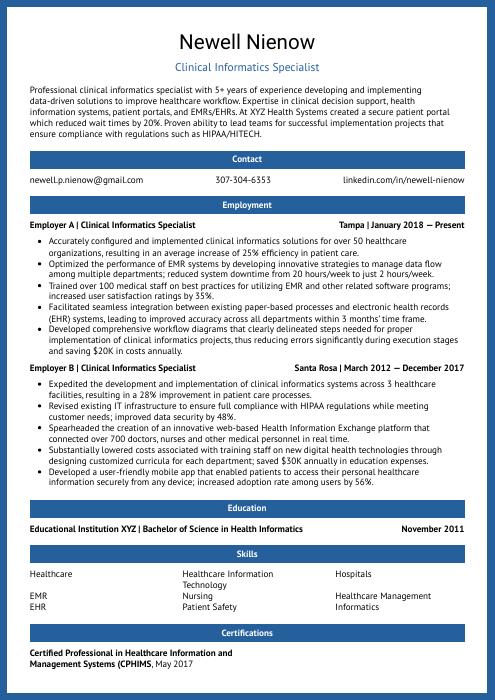 Ocelot
Ocelot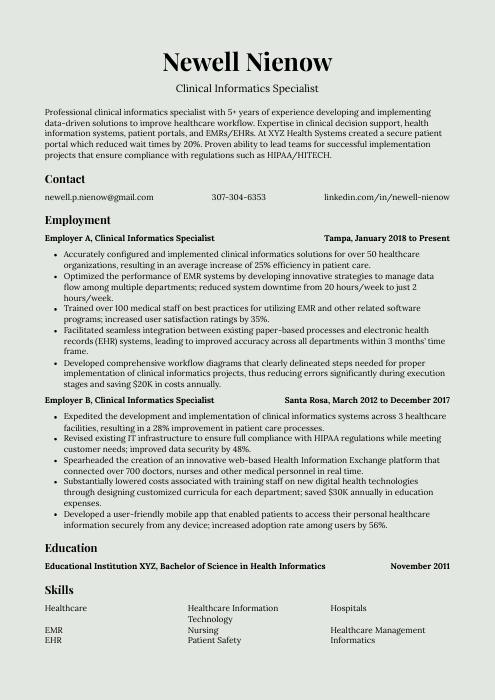 Saola
Saola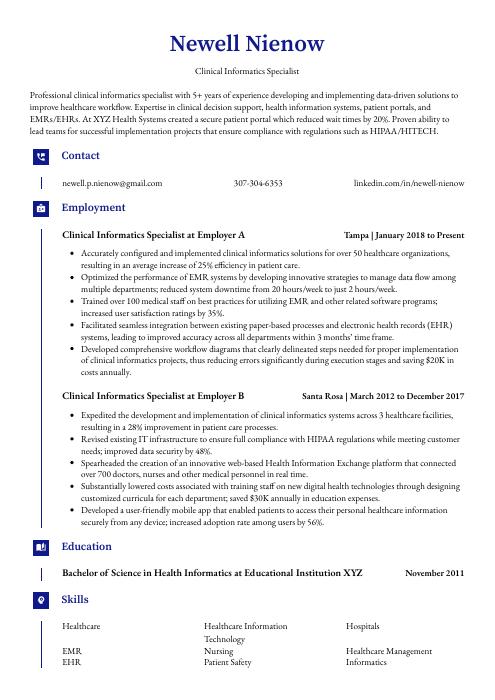 Gharial
Gharial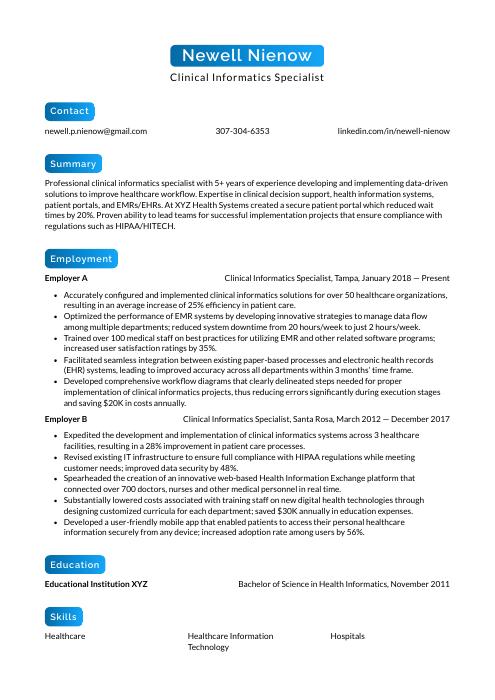 Kinkajou
Kinkajou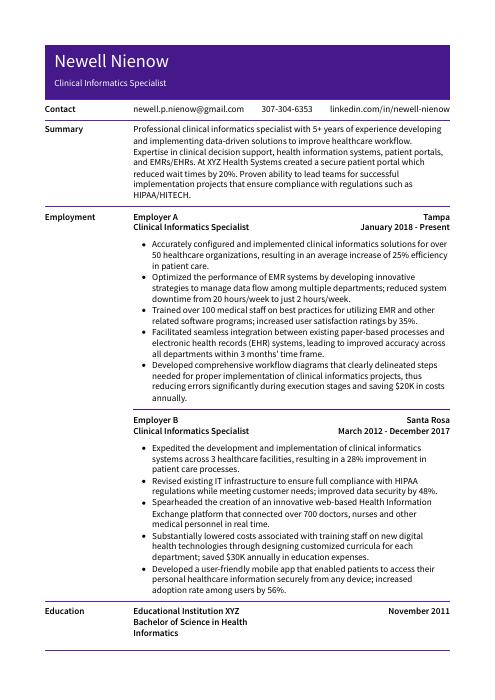 Pika
Pika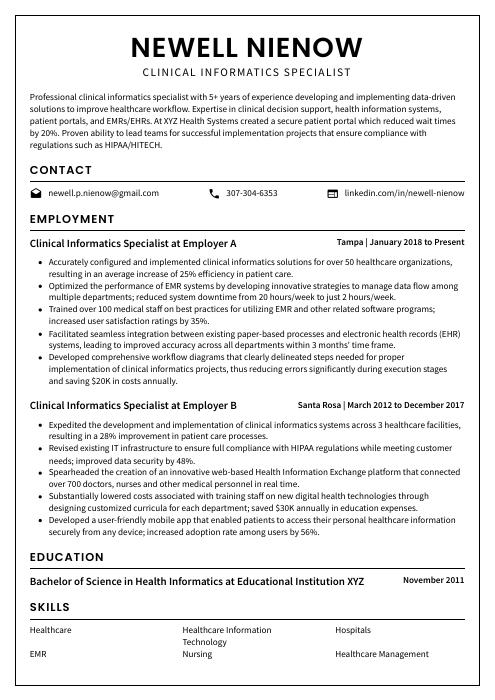 Cormorant
Cormorant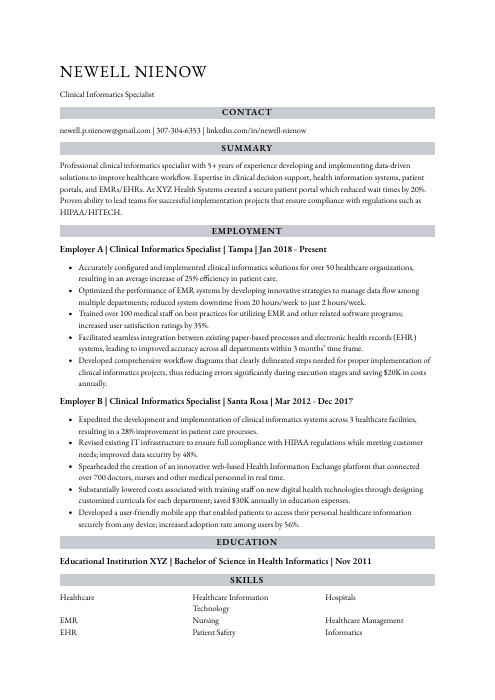 Numbat
Numbat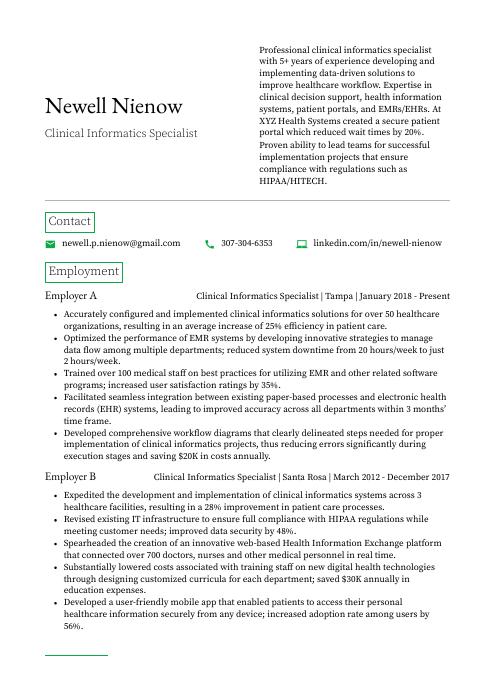 Quokka
Quokka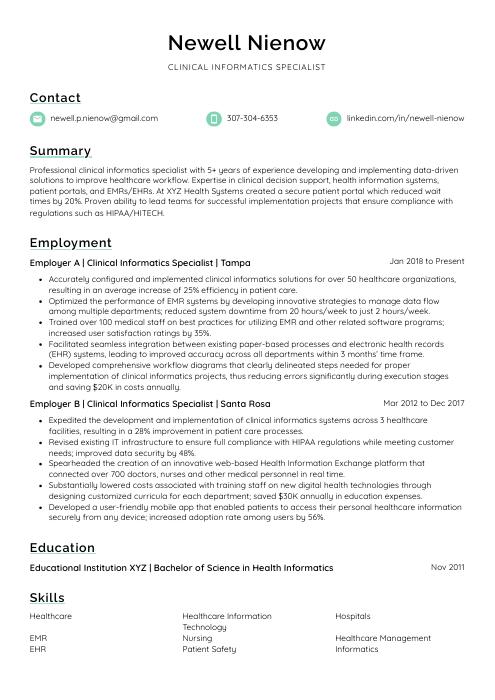 Lorikeet
Lorikeet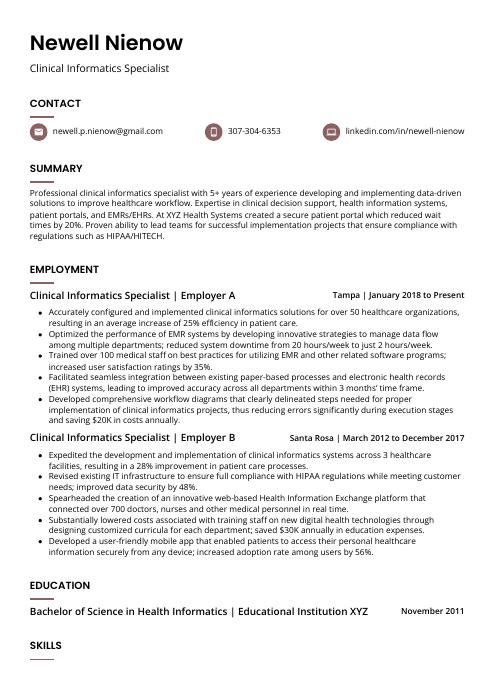 Fossa
Fossa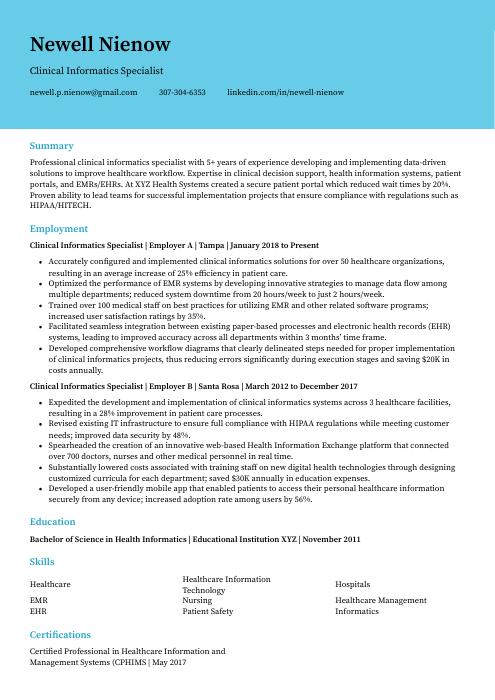 Dugong
Dugong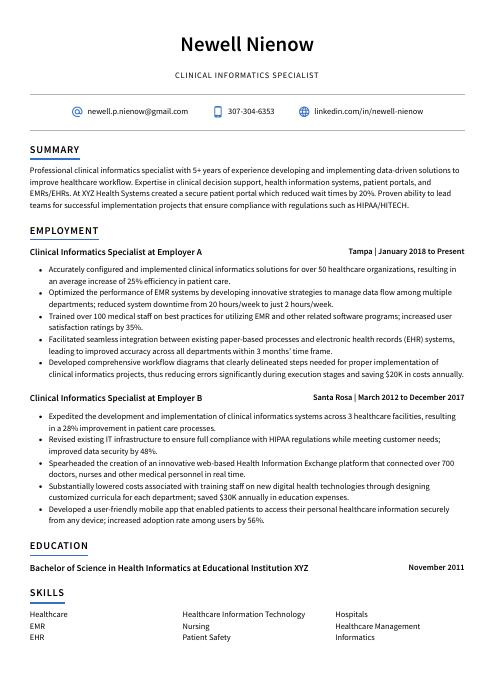 Axolotl
Axolotl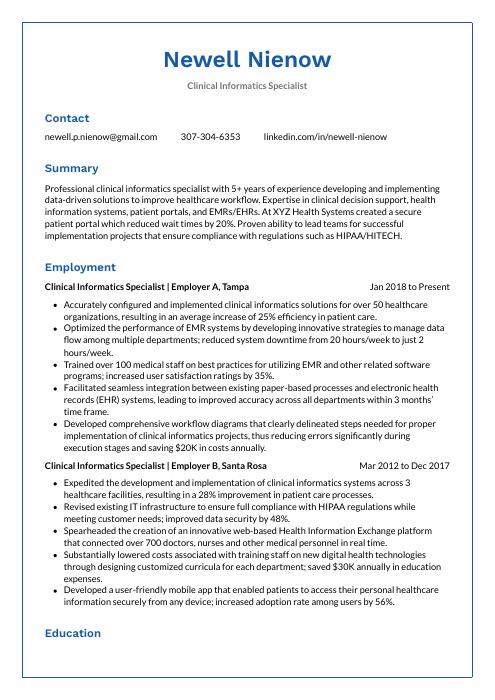 Markhor
Markhor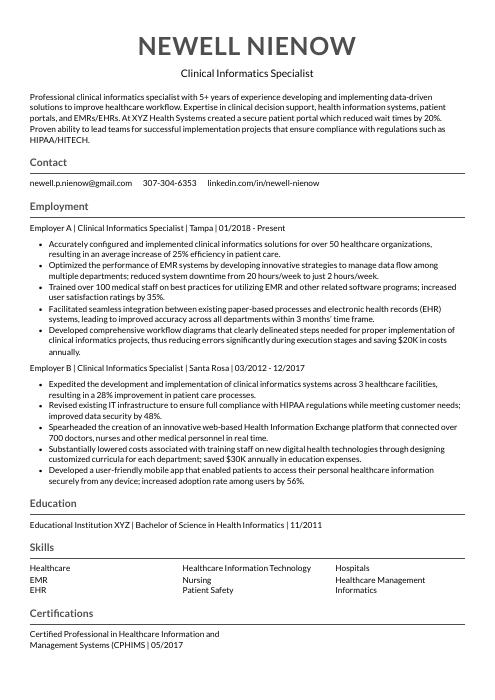 Indri
Indri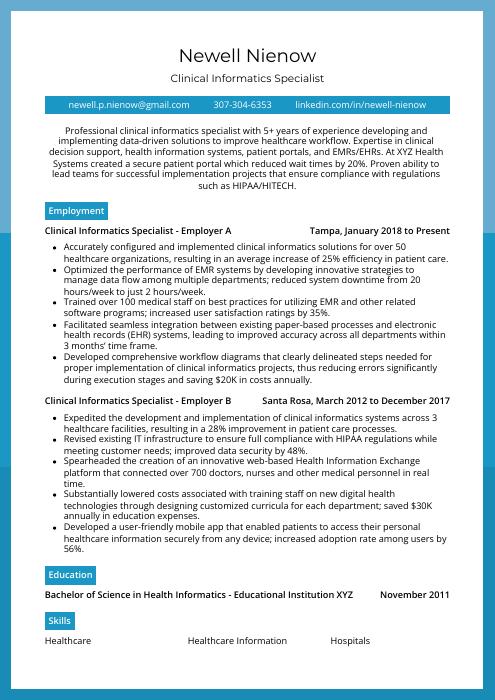 Rhea
Rhea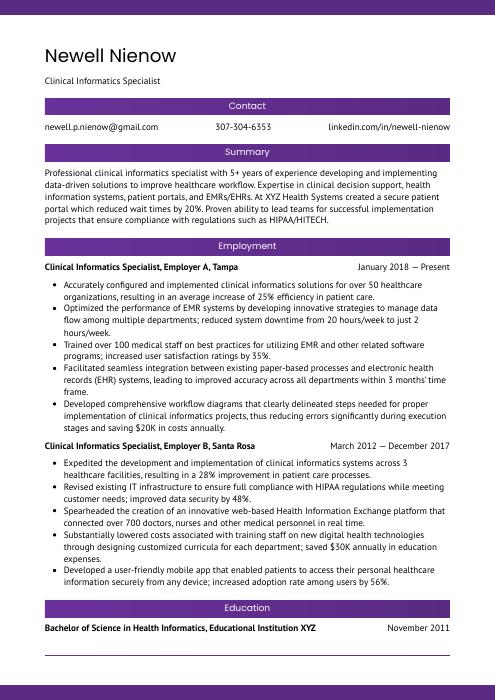 Jerboa
Jerboa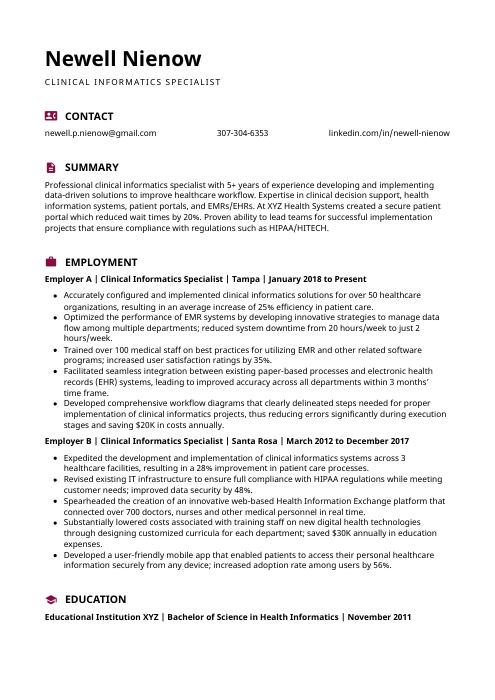 Hoopoe
Hoopoe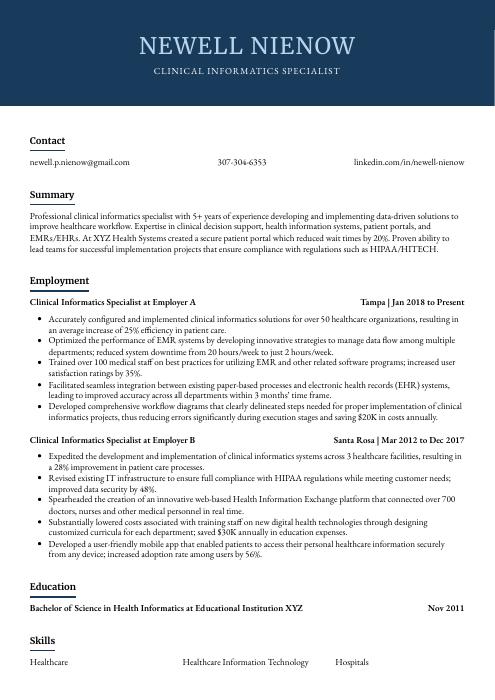 Bonobo
Bonobo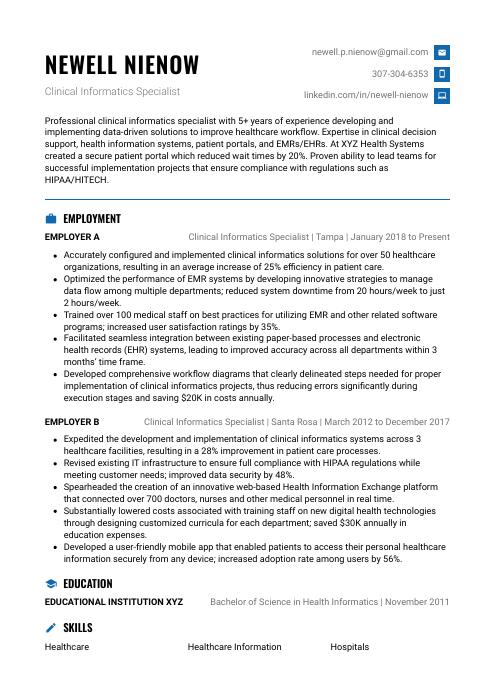 Echidna
Echidna Rezjumei
Rezjumei
